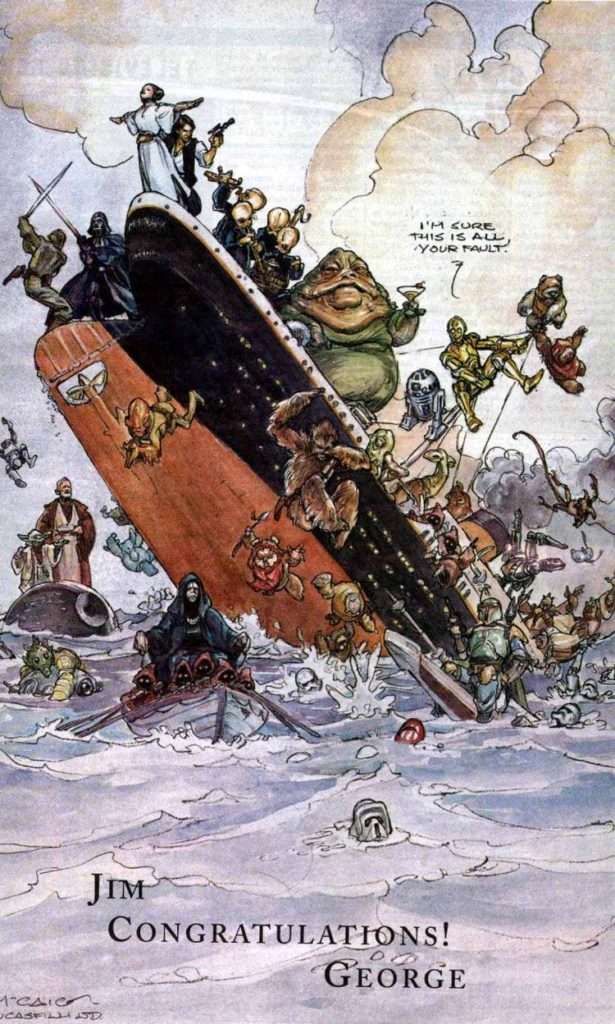1997
Since the 70s, the Oscars have been less and less concerned with what audiences enjoy. There was a brief blip with Rain Man, which had the world’s biggest star luring people in, but in general they were getting over recognizing crowd-pleasing popcorn movies as legitimate cinema.
And then along came Jimmy Cameron with a movie that would not be ignored.
Strap in, readers, we gots another longboi coming.
The Joint Champion
I mean it shouldn’t have worked. It was the most expensive movie ever made, and that rarely worked out for the previous title holders. Stories of turmoil from the set, the size of the budget, the fact that the fate of the lead characters seemed a foregone conclusion, some of us were bracing for anything from a Waterworld disappointment to a Cleopatra disaster.
But as I keep saying… never bet against James Cameron.
Titanic was an unstoppable juggernaut. It held number one at the box office for a record fifteen weeks, taking the record from Home Alone, and its weekly hauls didn’t drop beneath $20 million until week eleven, meaning it took the crown for biggest hit of all time blah blah inflation Gone With the Wind. And it wasn’t just audiences loving it, it was a critical darling that tied All About Eve for most Oscar nominations (14) and tied Ben-Hur for most Oscars won (11).
Rose (Kate Winslet) is a daughter of a high-class but suddenly broke family, forced by her stern, elitist mother Ruth (Frances Fisher, who I always think I know from something but I’m always thinking of Frances McDormand) to marry cruel millionaire Cal Hockley (Billy Zane). Jack Dawson (Leonardo DiCaprio) is a broke artist. Rose and Jack meet on the titular cruise ship, fall for each other, Jack tries to convince Rose to flee her future of misery and abuse, the ship sinks, he dies she doesn’t, I know you know all of that but if I don’t say it now discussing it later will feel weird, like waking up to find a room in your house is missing.
In short… it’s a doomed love story at its core, but it’s also another disaster movie, with greatly enhanced production values and a stronger narrative hook through Rose and Jack.
So… watching it again for the first time since the day after it won Best Picture… how is it?
First off, James Cameron scoffs at your complaints of “But we know how it ends.” Of course you know how it ends, there is zero ambiguity. The framing device ensures it: the story is being told by Elderly Rose (Romans Scandals’ second female lead Gloria Stuart) to deep sea salvager and Cameron self-insert Brock Lovett (Cameron movie stalwart Bill Paxton). Lovett’s crew walks us through exactly how the ship sank. And the same guy tells us that at one point Rose’s last name was “Dawson” but her husband of record’s wasn’t. The opening sequence of the framing device tells us everything that’s going to happen, because knowing the end doesn’t matter.
Love Story tells us how it’s going to end. Moulin Rouge! tells us how it’s going to end. Romeo and Juliet opens with a man coming to center stage and saying “these two gonna kill themselves.” And I hate to spoil things, but there are 24 official James Bond movies (and one they can’t release because the goddamned ratlickers won’t quarantine or mask up so we can have a society again), and only one where you could argue the villain wins. Titanic knows you know the ending, but says there’s value in watching the journey all the same.
And clearly people agreed. If this thing were selling itself on spectacle alone it would have faced tougher competition from The Lost World: Jurassic Park, which came out months earlier but was a distant second internationally, and only third domestically. Also it’s not the spectacle that people remember. When people recall this movie, for good or ill they recall the character beats, not the way the ship collapses. It’s “Jack I’m flying, ” or “I’m king of the world,” or “Paint me like one of your French girls,” or “You jump, I jump.” The characters land, with solid performances throughout, including Kathy Bates stealing scenes as Molly Brown and gift to the acting profession/OG Legend of Tomorrow Victor Garber as the ship’s designer.
Looking back at my Amadeus review, it is possible that one could again ask “Did this movie need a villain? Was the iceberg not enough?” Well, yes, yes it did, the existence of Cal and Mama Ruth allows for not only Rose’s entire arc, but adds urgency to the end, as Rose chooses to escape Cal and rejoin Jack.
More than that, this movie is about class inequality as much as it is about shipwrecks. The difference in treatment of first class and steerage (last time I was on a cruise, the only difference was room size and maybe a couple of amenities); the fact that society considers Cal better than Jack because Cal has money, when by any other metric it’s very untrue; and the oh-so-subtle sequence in which the first class pets are brought to the lower-class deck to relieve themselves (yes the decks are segregated so the wealthy don’t have to see a Poor). The most controversial parts for families of the real crew were ship staff pulling guns on the steerage passengers trying to get above decks, and a steerage passenger getting shot trying to get on a lifeboat. And beyond the hot take of “the rich are mean to the poor, also water is wet,” Cameron makes it clear that, especially in the 1910s, upper class life was kinda ridiculous. Witness the sheer joy and inclusiveness of the lower-class party compared to the stuffy, boring upper class cigars-and-brandy chat after dinner. Or how living an upper-class life has condemned Rose to misery, being expected to marry for status and wealth rather than finding a husband who sees her as more than a possession, and how her mother sees college as something a Lady of Standing does to find a husband and nothing else. Edwardian upper class life is rigidly defined by Proper Behaviour nobody is having any fun.
Even the ship itself is a symbol of Edwardian opulence over sense; lifeboats are short because they clutter the deck, the immense size meant it couldn’t turn worth a damn, the belief that it was unsinkable replaced any precautions should it sink.
No it’s not subtle, it’s as far from subtle as you can get without James Cameron walking onto screen and shouting “THE RICH ARE ASSHOLES,” but as I’d say to anyone complaining about Supergirl’s feminism, being loud about your message isn’t a fault when the problem is so entrenched. Looking at society in the year of our lord 2021 I’m thinking Titanic was too easy on class inequality, because some people clearly didn’t get it. I mean those ridiculous grifters at PragerU are trying to claim “billionaire” is a slur, for God’s sake, we obviously need more denigration of the upper classes.
I was bracing to say “It drags a little in the second hour,” but it turns out that it only drags a little between 1:14 and 1:24? Ish? So… ten minutes. It dragged for ten minutes. Then almost precisely at the halfway point, here’s the iceberg, and if you find the movie boring after that point, well, that’s a little on you.
Turns out, yes, Titanic is pretty good.
(And yes there was space for both Jack and Rose on the floating door but was there buoyancy, was there a way to physically do it without flipping, the text of the film says no, they’d have been in the water together and both died, also stop nitpicking and embrace the emotional statement you jag.)
I just said a lot of words about this movie but if that isn’t enough, and you have 40 minutes you can spare, Lindsay Ellis makes a lot of these points even better in “Is Titanic Good, Actually?”
And Rotten Tomatoes Says: It’s at #38, right above Amadeus and right below boat-movie-rival Mutiny on the Bounty. Feels like maybe some of the backlash got on that ranking, but whatever.
What’s The Real Best Picture? With a movie this widely beloved, what could I possibly claim should have L.A. Confidential, it is L.A. Confidential, I WILL DIE ON THIS HILL.
Other Events in Film
The Star Wars special editions came to theatres, letting fans see the full trilogy on the big screen with the fancy new effects that we discussed earlier. They mean that Star Wars, which brought in $138 million, passed Jurassic Park at the box office. Ever the gentleman, Spielberg took out a full page ad in variety of E.T. handing the crown to R2-D2. As one did.
It’s a classy gesture and I should have been looking them up sooner, because this happens basically every time the title changes hands.
- This Year in Superheroes: Joel Schumacher goes full-camp with the Adam West-inspired Batman and Robin. Fans hate it, it disappoints at the box office (not even making the top ten), but I rewatched it last fall and after 15 years of grimdark Batmen from Nolan and Snyder I was amazed how fun I found it now. We all owe Batman and Robin an apology.
- Also Spawn comes out. But we don’t owe it shit.
- But is any 90s superhero movie as rightly reviled as Shaquille O’Neal in Steel? I even like that character but they did him dirty. Between that and Batman and Robin, Warner Bros. gives up on superheroes for a while, shutting down production on Tim Burton’s planned Superman movie. Which, honestly, good.
- Men In Black, technically a comic adaptation, makes it to number two domestic but gets passed by The Lost World internationally.
- This Year in Bond: Tomorrow Never Dies might not quite be Goldeneye, but I like Jonathan Pryce as Rupert Murdoch-esque villain Elliot Carver, I like Michelle Yeoh as the Chinese agent Bond works with (although the climax does her a little dirty), I like Vincent Schiavelli’s brief appearance, it’s fun, I dig it.
- Christopher Guest begins his string of partially improvised mockumentaries with hilarious casts with Waiting for Guffman.
- Disaster movies continued with the competing volcano movies Dante’s Peak and the simply named Volcano.
- Howard Stern stars in Private Parts, a biopic of Howard Stern. That happened because we let it happen.
- There’s no real reason for a film history project to talk about John Cusack’s Grosse Pointe Blank… except that I love it.
- Mike Myers’ Bond parody Austin Powers: International Man of Mystery becomes a sleeper hit, spawning increasingly worse sequels, and maybe a fourth any year now. Possibly with a Jason Bourne-esque spy who was cryogenically frozen when the first Austin Powers came out. Well that’s what it should be.
- The Fifth Element is so good we overvalued director Luc Besson for decades.
- Disney’s Hercules tries to be as commercially appealing as possible, which never works. It’s a blow to the Disney Renaissance.
- If you haven’t seen Danny Boyle’s fantasy romance A Life Less Ordinary with Ewan McGregor and Cameron Diaz, I pity you.
- Kevin Costner’s The Postman is a disaster in every way Titanic wasn’t. That’s as far as his goodwill from Dances With Wolves lasted.
- Matt Damon and Ben Affleck co-write Good Will Hunting. The long-held gag was that Damon did the heavy lifting and Affleck slapped his name on it (there’s even a play about this, Matt and Ben), but it ain’t Damon who has two Oscars for writing.
Next Page: More doomed romance! Yaaaaaaaaay



